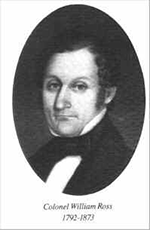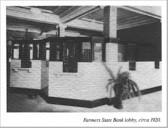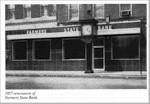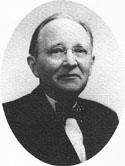History
Our Roots
Farmers State Bank, headquartered in Pittsfield, IL , has been locally owned since 1889 and remains one of the strongest banks in the nation. Farmers State Bank is ranked the number one bank in agriculture in its market areas of Pike, Scott, Greene, Jersey, Morgan and Adams Counties.
On January 26, 1889, just fourteen days after the State Banking law went into effect; the Pittsfield Bank was established and became the first Illinois bank to be chartered under the new banking law. Ross Matthews, grandson of Colonel Ross was one of the founders. The first year of business was successful and the bank enjoyed a $1,614.07 profit! On June 13, 1891 the Pittsfield Bank’s name was changed to Farmers State Bank, the first bank in Illinois to be known as Farmers State Bank.
Success has continued through the years with a direct descendent of Colonel and Edna Ross being involved in the bank. Earl Grigsby, who joined the bank in 1908 married Helen Lewis a grand-daughter of Colonel and Edna Ross in 1909. Earl’s son, Lewis, also became employed at the bank as did his son, Lewis Jr. Lewis Grigsby Jr’s son, Nevin is also with the bank, as the current President and 4th generation to lead the bank.
"The question of a new bank is settled" - Part 1
Pike County Democrat, December 20, 1888

When William Ross ventured to Illinois from Massachusetts with his four brothers in 1820, Pike County had yet to be established. Unsettled as the area was, he still chose it as the place to set down his family's roots because of its beauty, fertility and promise of a bright future. He had served in the 21st U.S. Infantry in the War of 1812.
At that time the land was simply a part of the "Military Tract" between the Illinois and Mississippi Rivers that Congress had deemed as "bounty land" for veterans of the War of 1812. Lack of much civilization gave Ross good reason to create a permanent settlement and thus he established Ross Settlement. One year later, on January 31, 1821, due partly to the impetus of Ross, Pike County was officially formed.
The part that the young adventurer Ross was to play in the history of Pittsfield and Pike County is an exciting and proud legend.
As a captain of the "First Rifles" Company, Ross was one of the first to willingly shoulder the responsibility of assembling the required quota of men from Pike County to serve in the Blackhawk War of 1832. Captain Ross proved a sound recruiter and motivator, and was rewarded with the honor of Colonel at the age of 40.
History states that one day while Colonel Ross was assembling the troops, his attention was captured by a lank, awkward youth. It was written that "Colonel Ross warmed to the boy," and appointed him captain of one of the Sangamon County companies. The boy was Abraham Lincoln.
After serving in the Blackhawk War, Colonel Ross served in the Illinois State legislature and Senate for several terms.
However, it was immediately following the Blackhawk War that Colonel Ross perhaps performed his greatest service. The time was 1833 and settlers had been pouring into Pike County. As was common in the days of horse and buggy, the county seat needed to be centrally located to facilitate a short journey from anywhere in the county.
Settlers in the area were pleased to discover that a central location could be easily obtained for their new county seat on an available tract of land located smack in the middle of Pike County. But at the cost of $1.25 an acre, the county simply couldn't raise the money.
Such an impasse was completely unacceptable to the determined Colonel Ross and he promptly advanced the sum of $200.00 for the purchase of the land.
In appreciation for his assistance, he was given the privilege of naming the town. Colonel Ross chose to name it after his old hometown of Pittsfield, Massachusetts.
History states that Colonel Ross was later repaid the $200.00 loan in full.
In the years that followed the establishment of Pittsfield, Illinois, there was a period of great growth. By 1865, the area had changed from uninhabited prairie to a prosperous farming community and finally to a bustling, civilized town of about 2,000 people. At the same time, Pike County had also been experiencing a population swell that brought its total number of inhabitants to over 30,000.
With such unprecedented growth that showed no signs of slowing, the area was clearly in need of a banking institution and Colonel Ross once again stepped in to help. Although political conditions were unstable and banking laws unsound, in 1854 he established Pike County's first real bank in Pittsfield, known as "Ross and Co." It was initially a success, but conditions worsened as threats of Southern secession progressed. With the advent of the Civil War and the accompanying unfavorable banking climate, Ross and Co. closed.
The time had obviously come for a completely new, comprehensive banking system based on adequate reserves to solve the problems that banks across the country were encountering.
In February of 1864, Congress had enacted the National Banking Act and President Lincoln, the lanky youth of Colonel Ross' military past, signed the law into effect. Although the law created a Comptroller of the Currency and set very strict reserve requirements for national banks, it did not address the dire situation in which many state banks found themselves.
Subsequently, the legislature of Illinois took it upon themselves to draw up the Illinois Banking Law which went into effect December 6, 1888. The new law provided that state banks would be under state inspection, required to publish quarterly reports of their financial condition and were to be fully examined by the State Auditor at least once a year.
Seven days after the new law went into effect, on December 13, 1888, this headline appeared in the Pike County Democrat: "Rumors are Very Rife as to a New Bank."
The article began:
"Rumors are very rife as to a new bank to be started here under the state banking law by several of our citizens . . . Parties in interest have already been looking for a room on the north side wherein to start, which would indicate that there is something more than wind in the talk."
"The Pittsfield Bank opened up Saturday with $30,000 in clean cash…" - Part 2
Pike County Democrat, January 31, 1889




Seven days after the first article appeared in the paper, the rumors were finally confirmed in this Pike County Democrat article: "The question of a new bank is settled. The incorporators are: Lewis Dutton, John Hull, Ross Matthews, son of Colonel A.C. Matthews, and Samuel Morgan. . . capital stock is fixed at $30,000 owned in equal proportions of $10,000 each by Messrs. Dutton and Hull and $5,000 each by Messrs. Matthews and Morgan. . . it is understood that Mr. Ross Matthews will be cashier and Sam Morgan, bookkeeper. The room occupied by George Peters on the north side as a barber shop has been secured for carrying on the business, and the bank will be open as soon as arrangements can be made for doing it. It will command public confidence at once as a safe and reliable institution "
Soon after, on January 26, 1889 the charter of the "Pittsfield Bank" was granted as the first Illinois bank to be chartered under the new banking law.
Things moved quickly and the Pike County Democrat reported the following on January 31 1889:
"The Pittsfield Bank opened up Saturday with its capital of $30,000 in clean cash in its safe as certified by the State Auditor and fully prepared for business. It expects to do a general banking business-receive deposits, sell exchange, loan money on real estate or personal security. It is the first bank in the state to organize under the new law, by which it is under state inspection and required to publish quarterly reports of its condition, as called for by the State Auditor, who is also required at least once a year to make a full examination of its condition. Its furniture, fixtures, safe having a time lock and all the latest improvements, are all first-class, and denote that the bank is going to stay and be a permanent institution of the county. Call in when in town and see for yourself."
The first officers of the new Pittsfield Bank were Lewis Dutton, President; John Hull, Vice-President; Ross Matthews, Cashier; and Samuel L. Morgan, Assistant Cashier.
It is interesting to note that Colonel William Ross, the "founding father" of Pittsfield, had a daughter, Anna, who was the wife of Colonel A.C. Matthews, and mother of Pittsfield Bank incorporator, Ross Matthews. Colonel A.C. Matthews distinguished himself in the Civil War, having been unanimously appointed as captain of the Pike County 99th Infantry Company which fought in the battles of Vicksburg, Tasche and Mobile. After the war he was sent to the Indian Territory where he received the surrender of the Indians and effected a treaty with the Choctaw tribe whereby they agreed to return their allegiance to the Union. Colonel Matthews returned to the practice of law and held several public offices, including Speaker of the Illinois General Assembly, Circuit Judge of Pike County and was appointed Comptroller of the Treasury of the United States by President Harrison on May 11, 1889. He was the author of the first amendment to the Illinois Constitution of 1870, known as the "Drainage Amendment" under which the Sny Island Levee Drainage District was legally organized by court order on May 24, 1880.
The bank's first year of business progressed smoothly and on December 2, 1889, the minutes show that the bank enjoyed a profit of $1,641.07. It also declared its first dividend of $300.00 at the director's meeting held on the same date.
At a special meeting of the stockholders held on June 9, 1891, they voted to change the name of the bank from "Pittsfield Bank" to "Farmers State Bank." On June 13, 1891, the Auditor of Public Accounts approved the adoption of the new name and the bank became the first bank in Illinois to bear the name "Farmers State Bank."
Ross Matthews served continuously as director, cashier and eventually president of the bank until he retired in 1918.
His father-in-law, John Hull, Sr., served as a director and vice president until 1895.
Trust powers were granted to the bank on July 15, 1927, and, ever since, an active trust department has served the needs of the Pittsfield community. The bank currently operates trusts that involve individuals, educational scholarships and churches as beneficiaries.
The original charter of the bank called for its duration to be 99 years. The charter has now been amended to where the duration of the bank is "perpetual."
Farmers State Bank is proud to have played an active role in the history and growth of Pittsfield and Pike County. We truly consider the opportunity to serve the community in any capacity an honor. Furthermore, we pledge to continue to do so to the very best of our ability.
EARL GRIGSBY - Part 3

1887-1975
Earl Shriver Grigsby was born November 28, 1887 in Pittsfield, Illinois. His interests as a boy went the way of most young men, horses, hunting and occasional bird watching. After graduating from high school and attending business school in Springfield, he took his first job as a clerk at the grocery store in Detroit, which required him to ride his horse back and forth to work everyday.
At the age of 21, Earl was asked to work at Farmers State Bank by Ross Matthews, who was then acting as the bank's cashier. He started working at the Bank on October 1, 1908, and worked continuously to the day of his death.
Earl married Helen Lewis, the great-granddaughter of Colonel William Ross, in 1909 and the couple celebrated their 60th wedding anniversary before her death in 1970.
On February 5, 1916, Earl Grigsby was appointed as cashier of the bank and went on to serve as director and senior operating officer until his death on February 8, 1975.
During his long lifetime, Earl was active in many community affairs. Among his favorites were the Pittsfield Lions Club and the Congregational church choir. He was an avid duck hunter and was also well-known for his well tended gardens.
Earl Grigsby loved his work at Farmers State Bank and the people of Pike County. He was proud of the Bank and proud of its customers, most of whom he had known since they were children. He loved his community and was totally immersed in all aspects of its activities.
As was reported in the Pike Press, Wednesday, February 12, 1975, "Anyway you look at it, he was a remarkable man."